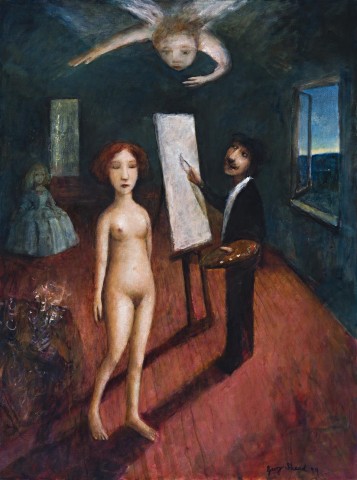HOMAGE TO VELASQUEZ, 1999
GARRY SHEAD
oil on canvas
122.0 x 91.0 cm
signed and dated lower right: Garry Shead 99
inscribed with title on stretcher bar verso: Homage to VELASQUEZ
Philip Bacon Galleries, Brisbane (label attached verso)
Private collection, Sydney
Garry Shead: Artist and the Muse, Philip Bacon Galleries, Brisbane, 8 September – 2 October 1999
Emerging almost seamlessly from the ‘Dance’ series during the late 1990s, the ‘artist and muse’ paintings, superbly encapsulated here by Homage to Velasquez, 1999 pay tribute to the techniques of the great European Masters - Goya, Velasquez and Rembrandt - by capturing a vision of the Muse that inspired their creative journeys. Thus depicting the Masters themselves in the intimate act of creation, the works typically feature the artist accompanied by the mythical muse of poetry, Erato, who appears as something magical, often hovering spirit-like in the studio and bathed in a radiant light. Notwithstanding the ostensibly secular iconography however, the figures seem to inhabit spiritually-charged spaces – there is profound tenderness in the artist's gaze for whom the Muse is a luminous revelation, guiding the Master's hands, cradling his palette or even taking brush to canvas.
Elaborating upon the importance of the Muse for Shead in his monograph on the artist, Sasha Grishin suggests, ‘Shead felt himself to be one of the few who consciously sought out Erato, and that at certain periods in his life he felt that he both saw her and heard her and that he in a sense was a willing medium through which her inspiration could act’.1 Accordingly, autobiographical undertones may be discerned in works such as the present, with Shead also paying passionate homage to the most profound source of artistic inspiration in his life, namely his wife Judit. Shead had first met the Hungarian-born Judit Englert, a classically-trained sculptor, during the European winter of 1981 – 82 when he was invited to visit Budapest by the Director of the Michael Karolyi Memorial Foundation in Vence. Drawn to Judit as ‘the woman who is my twin of the same kind’2, Shead stayed on in Budapest for a year before the couple eventually returned to Australia and married in June 1983.
As testament to their poignant connection, Shead had begun to include the presence of Judit (or her more abstracted role as 'Muse') in his work from the early 1990s. Indeed, the protagonist Frieda in his celebrated D.H. Lawrence series bears more than a passing resemblance with to Judit with her fine, aquiline nose, angular features and stylized bobbed hair, and equally, her likeness is apparent in the regal figure of Queen Elizabeth II in the important satirical sequence, The Royal Suite which he produced in 1995 – 96. However, it is not until works such as Homage to Velasquez with their complex labyrinth of ideas, that Shead most fully explores the insights of this deep and poignant source of artistic inspiration in his life. As Grishin elucidates, ‘Shead is an artist who in most instances has to enter the work by putting himself into the composition – whether he be Lawrence, Prince Philip, a dancer or, in this case, an artist. However by entering a composition this does not mean that he 'owns' it, as painting grows through its own internal logic and momentum; he enters it to give it life, then participates in the delight and agony of its growth and development’.3
1. Grishin, S., The Artist and Muse, Craftsman House, Sydney, 2001, p. 164
2. Shead cited ibid., p. 79
3. ibid., p. 174
VERONICA ANGELATOS
